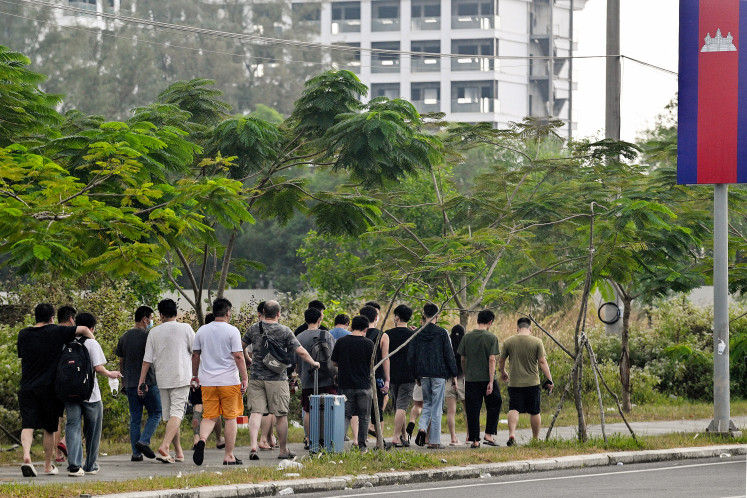Popular Reads
Top Results
Can't find what you're looking for?
View all search resultsPopular Reads
Top Results
Can't find what you're looking for?
View all search resultsWhy I remain hopeful despite Thailand's fragile democracy
Thai citizens are increasingly recognizing that political uncertainty breeds economic stagnation, with judicial overreach as the likely culprit.
Change text size
Gift Premium Articles
to Anyone
 A banner is wrapped around the Democracy Monument during a protest following the suspension of Move Forward Party leader and prime ministerial candidate Pita Limjaroenrat in Bangkok on July 19, 2023. Thailand's constitutional court suspended reformist Pita Limjaroenrat on July 19, in another blow to his hopes of becoming the nation's next leader after a stunning election win. (AFP/Jack Taylor)
A banner is wrapped around the Democracy Monument during a protest following the suspension of Move Forward Party leader and prime ministerial candidate Pita Limjaroenrat in Bangkok on July 19, 2023. Thailand's constitutional court suspended reformist Pita Limjaroenrat on July 19, in another blow to his hopes of becoming the nation's next leader after a stunning election win. (AFP/Jack Taylor)
I
n Thailand, politics often prove stranger than fiction. Having won the majority of seats in last year's general elections, my party and I now find ourselves entangled in legal battles rather than governing as mandated by 14 million voters.
The Thai elite, through their institutionalized counter-majoritarian mechanisms, have accused us of attempting to overthrow the state. This sweeping charge stems from our proposal to amend Thailand's lèse-majesté law, hoping to prevent its exploitation as a tool to silence political opponents and instill fear in critics.
Tomorrow, the Constitutional Court is set to rule without further investigation or seeking my appearance. A guilty verdict would lead to the dissolution of Thailand's largest political party and potentially ban me, along with many colleagues, from politics for life.
Yet, while a cursory glance suggests Thai democracy faces a grievous threat, hampering our constituents' aspirations for a better country, a closer inspection offers glimmers of hope.
First, Thai citizens are increasingly recognizing that political uncertainty breeds economic stagnation, with judicial overreach as the likely culprit. This realization was not as prevalent before the current round of instability.
Once one of Asia's tigers with an economy dubbed "Teflon", Thailand's political problems did not significantly affect its economic attractiveness. However, those days are long gone, with Thailand being the worst performer among ASEAN's six largest economies in the first quarter of 2024.
Public disagreements between the embattled prime minister and the governor of the Bank of Thailand over interest rates have dampened economic confidence. Thailand's growth engines, led by tourism and private consumption, are sluggish; agricultural and industrial production and exports are contracting, while household and corporate debts continue to rise. Our economic problems are structural, attributable to a loss of competitiveness in human capital and a failure to transition from manufacturing to digital technology.


















